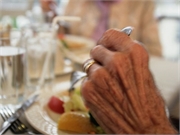Yet, very few are able to access government food benefits, including food stamps or home-delivered meals
THURSDAY, May 14, 2020 (HealthDay News) — One in seven adults ages 50 to 80 years say they experienced household food insecurity in the past year (before the COVID-19 pandemic), according to a report published online May 11 based on the results of the University of Michigan National Poll on Healthy Aging.
The poll, carried out by the University of Michigan Institute for Healthcare Policy and Innovation in Ann Arbor, included a national sample of 2,048 older adults (aged 50 to 80 years) who responded to questions about food security in December 2019.
The researchers found that 14 percent of older adults experienced food insecurity in the past year, with the percentage even higher among those in their pre-Medicare years (aged 50 to 64 years; 17 percent) and those who are African-American or Latino (22 percent for both). Older adults with lower household incomes (<$30,000) and a high school education or less also were more likely to say they had had trouble getting food (32 and 21 percent, respectively). Forty-five percent of respondents who rated their health as fair or poor reported food insecurity, as did 24 percent with poor mental health. Yet, only one-third reporting food insecurity were receiving Supplemental Nutrition Assistance Program benefits ("food stamps"). Less than 2 percent of those older than 60 years and eligible for home-delivered or congregate meals received free meals at senior centers or delivered to their home (e.g., Meals on Wheels).
“This research reaffirms that many older adults struggle to afford the food they need, and are not using available food and nutrition assistance programs,” Alison Bryant, Ph.D., senior vice president of research for AARP, said in a statement. “The current crisis makes it even more urgent to ensure that our most vulnerable populations can access the nutrition they need.”
Copyright © 2020 HealthDay. All rights reserved.








